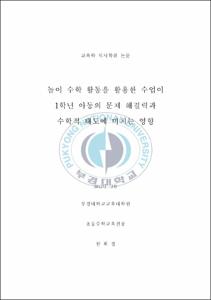놀이 수학 활동을 활용한 수업이 1학년 아동의 문제 해결력과 수학적 태도에 미치는 영향
- Abstract
- In this study we analyzes the effect of math play learning on first-graders' problem-solving ability and mathematical attitude for the improvement of teaching methods.
For this study, 2 classes of first graders who go to D elementary school were chosen and divided into an experimental class and a comparative class. The experimental class were taught through the lesson plans based on the mathematics play, and the comparative class were taught through the regular lesson plan based on the regular materials. Both groups were initially given tests to measure mathematical problem solving ability and attitudes. Once the experimental study was completed, both groups were once again given the same tests to determine if significant changes had occurred.
The conclusions of the study are as follows.
First, math play learning is more effective at improving first-graders' math problem solving ability than regular educational methods. Math play learning motivates students and gets them interested in learning math, resulting in an increase in student' math problem solving skills.
Second, through math play learning, students feel more confidence, more achievement motivation, increased interest in math. Most first grade students don't feel engaged by their school math classes due to the prevalence of preemptive education in which students learn class material beforehand at home or in private educational institutes. By having math play learning, students are able to feel interest in math classes once again.
- Issued Date
- 2012
- Awarded Date
- 2012. 2
- Type
- Dissertation
- Publisher
- 부경대학교 교육대학원
- Department
- 교육대학원 초등수학교육전공
- Advisor
- 신준용
- Table Of Contents
- Ⅰ. 서론 1
1.1 연구의 필요성 및 목적 1
1.2 연구 과제 4
1.3 연구의 제한점 4
1.4 용어의 정의 5
1.5 기대되는 효과 6
Ⅱ. 이론적 배경 8
2.1 놀이 학습의 의미 8
2.2 놀이 수학의 이론 10
2.3 놀이 학습의 효과 14
2.4 수학 놀이 학습의 장․단점 16
2.5 수학 놀이 학습에서 고려할 사항 17
2.6 놀이를 통한 수학 학습의 방향 19
Ⅲ. 연구 방법 25
3.1 연구 대상 및 기간 25
3.2 연구 설계 25
3.3 놀이 수학 활동 적용 29
Ⅳ. 연구 과제의 결과 및 분석 39
4.1 연구 과제 <Ⅰ>의 결과 및 분석 39
4.2 연구 과제 <Ⅱ>의 결과 및 분석 40
Ⅴ. 결론 및 제언 45
5.1 결론 45
5.2 제언 46
부록 49
- Degree
- Master
- Files in This Item:
-
-
Download
 놀이 수학 활동을 활용한 수업이 1학년 아동의 문제 해결력과 수학적 태도에 미치는 영향.pdf
기타 데이터 / 2.2 MB / Adobe PDF
놀이 수학 활동을 활용한 수업이 1학년 아동의 문제 해결력과 수학적 태도에 미치는 영향.pdf
기타 데이터 / 2.2 MB / Adobe PDF
-
Items in Repository are protected by copyright, with all rights reserved, unless otherwise indicated.